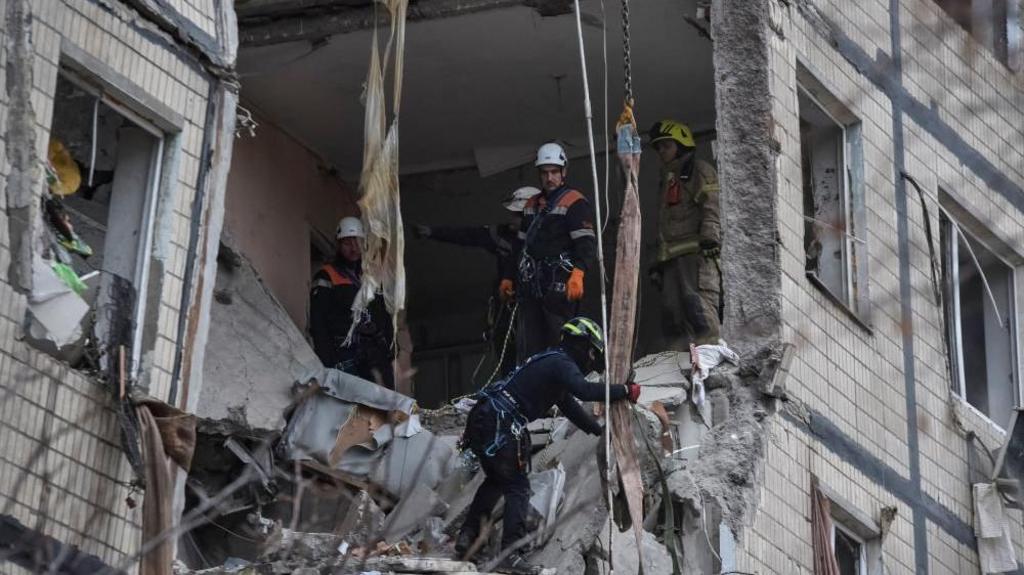At least six individuals have been confirmed dead following an overnight barrage of Russian missile and drone strikes targeting Ukrainian energy infrastructure and residential areas.
A direct hit on an apartment complex in Dnipro resulted in two fatalities and twelve injuries, while Zaporizhzhia reported three deaths.
In total, approximately 25 locations across Ukraine, including the capital Kyiv, sustained damage, leading to widespread power and heating outages. Prime Minister Yulia Svyrydenko communicated via Telegram that significant energy facilities in the Poltava, Kharkiv, and Kyiv regions were affected, and efforts to restore power are currently underway.
The Russian Defence Ministry has stated that its forces intercepted 79 Ukrainian drones during the same period.
According to the Ukrainian Air Force, Russia launched over 450 explosive drones and 45 missiles. It was reported that nine missiles and 406 drones were successfully shot down.
Ukraine’s Energy Ministry reported power disruptions in the Dnipropetrovsk, Chernihiv, Zaporizhzhya, Odesa, and Kirovohrad regions, with restoration efforts in progress.
Prime Minister Svyrydenko stated that critical infrastructure facilities have been reconnected and water supply is being maintained through the use of generators.
The Russian Federation maintains that its attacks on energy infrastructure are strategically aimed at Ukrainian military assets.
These strikes against Ukraine’s energy infrastructure, occurring prior to the onset of winter, have become a recurring pattern in the conflict. Officials in Kyiv are expressing heightened concerns that Moscow’s objective extends beyond undermining morale to potentially crippling Ukraine’s economy through the disruption of its energy network.
Analysts suggest that this fourth winter since Russia’s full-scale invasion will represent a significant test of Ukraine’s resilience.
Ukrainian President Volodymyr Zelensky stated that the attacks underscore the necessity for “no exceptions” in Western sanctions targeting Russian energy, as a means of applying pressure on Moscow.
These missile strikes occurred mere hours after the United States granted Hungary a one-year exemption from restrictions concerning the purchase of oil and gas from Russia.
In October, the US effectively blacklisted two of Russia’s largest oil companies, threatening sanctions on entities engaging in transactions with them.
However, on Friday, during a visit to Washington by Hungarian Prime Minister Viktor Orban – a close personal and political ally of Donald Trump – the US president announced the exemption for Budapest.
In a Telegram message, President Zelensky asserted that the overnight attacks highlight the need for “intensified pressure” on Russia.
He stated that “for every Moscow strike on energy infrastructure – aimed at harming ordinary people before winter – there must be a sanctions response targeting all Russian energy, with no exceptions”.
President Zelensky stated Ukraine’s expectation of “relevant decisions from the US, Europe and the G7”.
Discussions surrounding sanctions may appear technical or diplomatic; however, they carry tangible implications for the people of Ukraine.
Russia’s capacity to sell oil to Hungary directly correlates to its ability to fund the production of drones and missiles, such as those deployed against Ukraine on Friday night.
The battle for Pokrovsk – on a big road and rail artery in the Donetsk region – has been going on for well over a year.
It is unclear whether the citizens were fighting on behalf of Russia or Ukraine.
A BBC investigation finds evidence that young African women are being tricked into building Russian drones.
Fierce battles are taking place in the Donetsk town that Russia has been trying to occupy for over a year.
Chris Wright says the tests will be “non-critical explosions”, meaning that Americans would not be seeing mushroom clouds.

